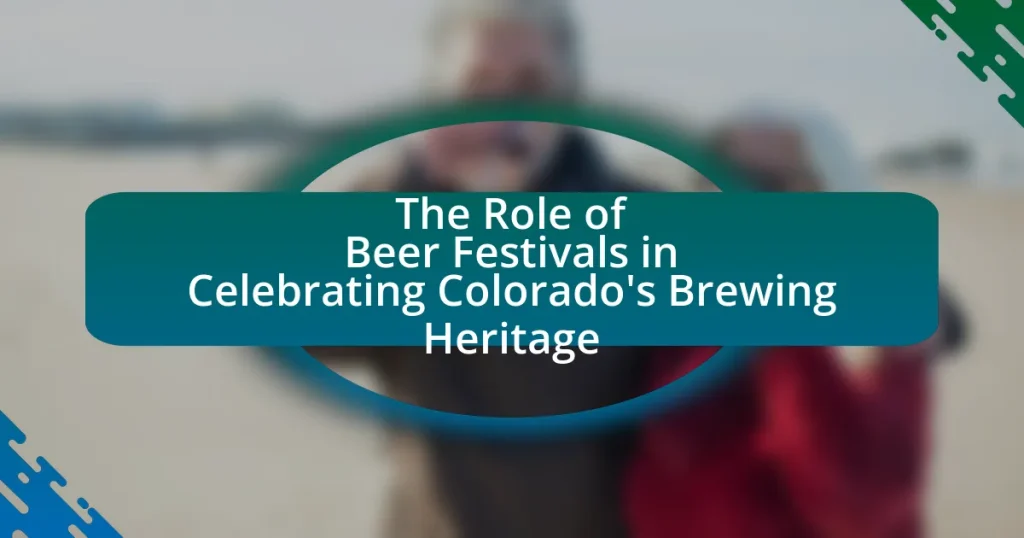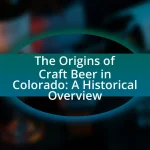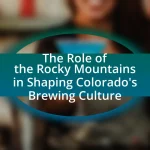Beer festivals play a crucial role in celebrating Colorado’s brewing heritage by showcasing the state’s extensive craft beer culture and fostering community engagement. With over 400 breweries, these festivals highlight local craftsmanship, promote education about brewing techniques, and support local economies. Key events, such as the Great American Beer Festival, reflect Colorado’s brewing history and evolution, while also providing a platform for breweries to connect with consumers. Additionally, beer festivals enhance community ties, promote local pride, and face challenges such as regulatory hurdles and weather conditions, all while adapting to emerging trends like sustainability and technological innovations.
What is the significance of beer festivals in Colorado’s brewing heritage?
Beer festivals are significant to Colorado’s brewing heritage as they celebrate the state’s rich craft beer culture and foster community engagement. These festivals showcase a diverse array of local breweries, highlighting Colorado’s status as one of the leading craft beer states in the U.S., with over 400 breweries as of 2023. They provide a platform for brewers to connect with consumers, educate attendees about brewing techniques, and promote local ingredients, thereby reinforcing the importance of local sourcing in the brewing process. Additionally, events like the Great American Beer Festival, held annually in Denver, attract thousands of visitors, contributing to the local economy and enhancing Colorado’s reputation as a craft beer destination.
How do beer festivals reflect Colorado’s brewing history?
Beer festivals in Colorado serve as a vibrant reflection of the state’s brewing history by showcasing the diverse range of local craft beers and celebrating the culture surrounding them. These festivals highlight Colorado’s evolution from its early brewing roots in the 19th century, when German immigrants introduced lager brewing, to its current status as a leader in the craft beer movement, with over 400 breweries as of 2023. Events like the Great American Beer Festival, held annually in Denver, not only attract thousands of attendees but also feature competitions that recognize the quality and innovation of Colorado brewers, reinforcing the state’s reputation as a brewing hub.
What historical events have shaped Colorado’s brewing culture?
The historical events that have shaped Colorado’s brewing culture include the establishment of the first commercial brewery in 1859, the influx of German immigrants in the late 19th century, and the legalization of craft brewing in the 1970s. The first commercial brewery, the Rocky Mountain Brewery, marked the beginning of organized brewing in the state. German immigrants brought traditional brewing techniques and lager styles, significantly influencing local beer production. The legalization of craft brewing in 1978, following the repeal of Prohibition, led to a surge in microbreweries and craft beer culture, establishing Colorado as a prominent brewing hub in the United States.
How have beer festivals evolved over the years in Colorado?
Beer festivals in Colorado have evolved significantly from small local gatherings to large-scale events that attract thousands of attendees. Initially, these festivals focused primarily on showcasing local breweries and their offerings, but over the years, they have expanded to include a diverse range of craft beers from both regional and national breweries. For instance, the Great American Beer Festival, which began in 1982 with just 24 breweries, has grown to feature over 800 breweries and thousands of different beers, reflecting the booming craft beer industry in Colorado. This evolution highlights the increasing popularity of craft beer culture and the state’s role as a leader in the brewing community, with Colorado now home to more than 400 breweries.
What role do beer festivals play in community engagement?
Beer festivals play a significant role in community engagement by fostering social interaction and local pride among residents. These events create a platform for breweries, local businesses, and community members to connect, share experiences, and celebrate regional culture. For instance, beer festivals often feature local craft breweries, which not only showcase their products but also contribute to the local economy, enhancing community ties. Additionally, studies have shown that such festivals can increase community cohesion by bringing diverse groups together, promoting inclusivity and collaboration among participants.
How do beer festivals foster local pride and identity?
Beer festivals foster local pride and identity by showcasing regional breweries and their unique offerings, which reflect the community’s culture and craftsmanship. These events create a platform for local brewers to connect with residents and visitors, promoting a sense of belonging and shared heritage. For instance, Colorado’s beer festivals often highlight the state’s brewing history, featuring local ingredients and traditional brewing methods that resonate with the community’s identity. This celebration of local craftsmanship not only boosts economic activity but also strengthens social ties among residents, reinforcing their pride in local achievements and traditions.
What impact do beer festivals have on local economies?
Beer festivals significantly boost local economies by increasing tourism, generating sales tax revenue, and supporting local businesses. For instance, a study by the Brewers Association found that beer festivals can attract thousands of visitors, leading to increased spending in hotels, restaurants, and retail shops. In Colorado, events like the Great American Beer Festival contribute millions in economic impact, with local breweries benefiting from heightened visibility and sales opportunities. This influx of visitors and spending creates jobs and stimulates economic growth within the community.
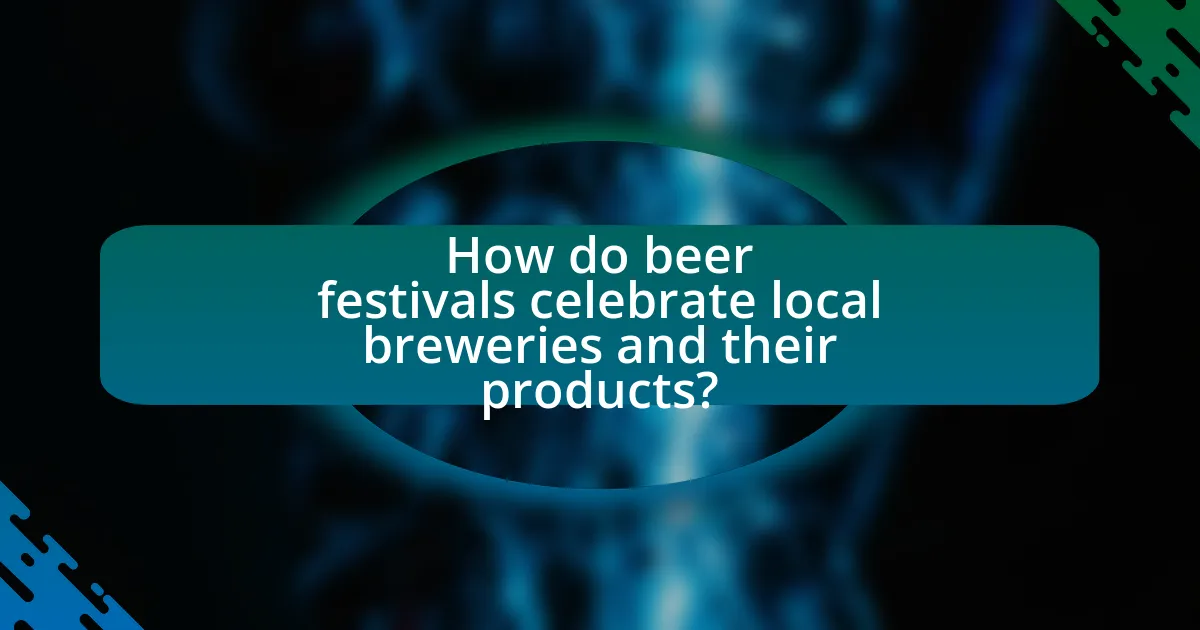
How do beer festivals celebrate local breweries and their products?
Beer festivals celebrate local breweries and their products by providing a platform for these breweries to showcase their unique offerings directly to consumers. These events often feature a diverse range of craft beers from local breweries, allowing attendees to sample and appreciate the distinct flavors and brewing techniques that characterize the region’s brewing heritage. For instance, festivals like the Great American Beer Festival in Denver highlight Colorado’s rich brewing culture, with over 800 breweries participating, showcasing thousands of beers. This direct interaction fosters community engagement and supports local economies by promoting local businesses and encouraging attendees to explore and purchase products from these breweries.
What types of breweries participate in Colorado’s beer festivals?
Colorado’s beer festivals feature a diverse range of breweries, including craft breweries, microbreweries, and regional breweries. Craft breweries, which focus on small-batch production and unique flavors, represent a significant portion of participants, showcasing the state’s innovative brewing culture. Microbreweries, often defined by their limited production capacity, contribute to the local scene by offering specialized and experimental brews. Additionally, regional breweries, which may have a larger distribution but still emphasize quality and local ingredients, also participate, highlighting Colorado’s rich brewing heritage. This variety reflects the state’s commitment to celebrating its brewing traditions and fostering community engagement through these festivals.
How do craft breweries showcase their unique offerings at these events?
Craft breweries showcase their unique offerings at events by presenting a diverse range of specialty beers that highlight their distinct brewing techniques and local ingredients. These breweries often create limited-edition brews specifically for festivals, allowing them to stand out among competitors. For example, many craft breweries utilize unique flavor profiles, such as incorporating local fruits or spices, which not only reflects their creativity but also connects them to the regional culture. Additionally, breweries engage attendees through interactive experiences, such as tastings and educational sessions about their brewing processes, further emphasizing their unique identities. This approach not only attracts beer enthusiasts but also fosters a deeper appreciation for the craft beer community and its heritage.
What are the benefits for breweries participating in beer festivals?
Breweries participating in beer festivals benefit from increased visibility and brand recognition. These events attract large crowds, providing breweries with the opportunity to showcase their products to a diverse audience, which can lead to higher sales and customer engagement. For instance, a study by the Brewers Association found that breweries that participate in festivals often see a significant boost in sales, with many reporting a 20% increase in sales following the event. Additionally, beer festivals facilitate networking opportunities with other industry professionals, fostering collaborations and partnerships that can enhance a brewery’s market presence.
How do beer festivals promote beer education and appreciation?
Beer festivals promote beer education and appreciation by providing attendees with direct access to a diverse range of breweries and their products, facilitating tastings, and hosting educational sessions. These events often feature workshops led by industry experts, where participants can learn about brewing techniques, beer styles, and flavor profiles. For instance, the Great American Beer Festival showcases thousands of beers from hundreds of breweries, allowing consumers to engage with brewers and gain insights into the brewing process. Additionally, many festivals include guided tastings that emphasize the importance of ingredients and brewing methods, enhancing attendees’ understanding and appreciation of craft beer. This combination of hands-on experience and expert knowledge fosters a deeper connection to the craft beer community and its heritage.
What educational activities are commonly found at beer festivals?
Beer festivals commonly feature educational activities such as brewing demonstrations, beer tastings led by experts, and workshops on beer styles and food pairings. These activities aim to enhance attendees’ understanding of the brewing process, the diversity of beer flavors, and the cultural significance of beer in Colorado’s heritage. For instance, many festivals include sessions where brewers explain their techniques and ingredients, providing insights into the craft of brewing. Additionally, tastings often involve guided experiences that educate participants on how to identify different aromas and flavors in various beer styles, reinforcing the connection between beer and local traditions.
How do beer tastings enhance the understanding of different beer styles?
Beer tastings enhance the understanding of different beer styles by allowing participants to experience the distinct flavors, aromas, and characteristics of each style firsthand. This experiential learning fosters a deeper appreciation for the nuances that differentiate styles such as IPAs, stouts, and lagers. Research indicates that sensory evaluation during tastings helps individuals identify specific ingredients and brewing techniques that contribute to each beer’s profile, thereby enriching their knowledge and enjoyment of craft beer.
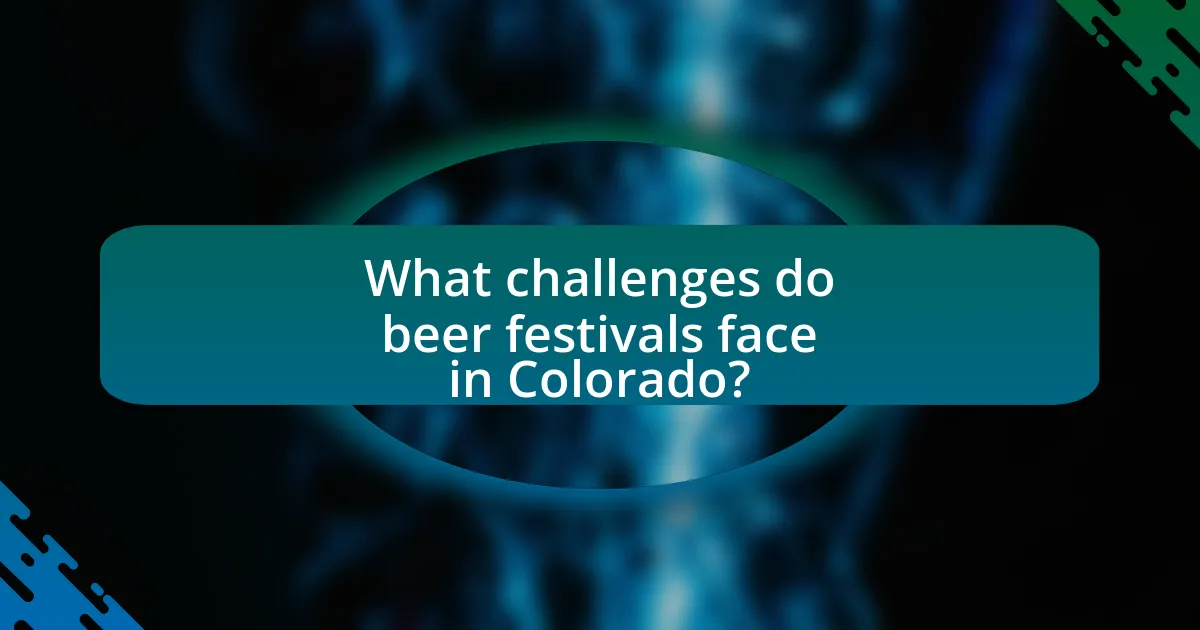
What challenges do beer festivals face in Colorado?
Beer festivals in Colorado face several challenges, including regulatory hurdles, weather conditions, and competition from other events. Regulatory hurdles often involve obtaining the necessary permits and adhering to state and local alcohol laws, which can be complex and time-consuming. Weather conditions can impact attendance and overall experience, as many festivals are held outdoors during unpredictable seasons. Additionally, competition from other local events can dilute attendance and sponsorship opportunities, making it difficult for individual festivals to thrive. These factors collectively pose significant obstacles to the successful execution of beer festivals in Colorado.
How do regulations impact the organization of beer festivals?
Regulations significantly impact the organization of beer festivals by dictating licensing, health, safety, and operational standards. These regulations require festival organizers to obtain permits, adhere to local alcohol laws, and ensure compliance with health codes, which can affect the scale and logistics of the event. For instance, Colorado law mandates that festivals must have a special event permit issued by the state, which includes stipulations on the types of alcohol served and the hours of operation. Additionally, health regulations may require sanitation measures and crowd control protocols, influencing the overall experience and safety of attendees.
What are the common logistical challenges faced by festival organizers?
Festival organizers commonly face logistical challenges such as crowd management, vendor coordination, and transportation logistics. Effective crowd management is crucial to ensure safety and enhance the attendee experience, as evidenced by incidents at large events where poor crowd control led to injuries. Vendor coordination involves managing multiple suppliers and ensuring timely delivery of goods and services, which can be complicated by last-minute changes or cancellations. Transportation logistics, including parking and shuttle services, are essential for facilitating attendee access and can become problematic if not properly planned, leading to congestion and delays. These challenges require careful planning and execution to ensure a successful festival.
How do weather conditions affect beer festival attendance and experience?
Weather conditions significantly influence beer festival attendance and experience by affecting both the willingness of attendees to participate and their overall enjoyment. For instance, favorable weather, such as sunny and mild temperatures, tends to increase attendance, as people are more likely to venture outdoors for social events. Conversely, inclement weather, including rain or extreme heat, can deter potential attendees, leading to lower turnout rates. Research indicates that festivals held in pleasant weather conditions can see attendance increases of up to 30%, while adverse weather can reduce attendance by similar margins. Additionally, weather impacts the experience itself; good weather enhances social interactions and enjoyment of outdoor activities, while poor weather can lead to discomfort and a less enjoyable atmosphere.
What trends are emerging in Colorado’s beer festivals?
Emerging trends in Colorado’s beer festivals include a focus on sustainability, increased diversity in beer styles, and the incorporation of local food pairings. Sustainability is becoming a priority, with many festivals implementing eco-friendly practices such as composting and using biodegradable materials. Additionally, there is a growing interest in unique and experimental beer styles, reflecting the state’s innovative brewing culture. Local food pairings are also gaining prominence, enhancing the overall festival experience by showcasing Colorado’s culinary offerings alongside its craft beers. These trends highlight the evolving nature of beer festivals as they adapt to consumer preferences and cultural shifts.
How are sustainability practices being integrated into beer festivals?
Sustainability practices are being integrated into beer festivals through initiatives such as waste reduction, local sourcing, and eco-friendly transportation options. Many festivals now implement recycling and composting programs to minimize waste, with some reporting up to 90% diversion from landfills. Additionally, organizers prioritize local breweries and food vendors to reduce carbon footprints associated with transportation. Some festivals also encourage attendees to use public transport or provide shuttle services to decrease vehicle emissions. These practices not only enhance the environmental responsibility of the events but also align with the growing consumer demand for sustainable practices in the food and beverage industry.
What innovations are being introduced to enhance the festival experience?
Innovations being introduced to enhance the festival experience include the use of mobile apps for real-time updates and interactive maps, which improve attendee navigation and engagement. These apps often feature functionalities such as personalized schedules, vendor information, and social media integration, allowing festival-goers to connect with others and share their experiences. Additionally, advancements in payment technology, such as contactless payments and digital wallets, streamline transactions, reducing wait times and enhancing convenience. These innovations are supported by data indicating that festivals utilizing technology report higher attendee satisfaction and increased participation rates.
What are some best practices for attending Colorado’s beer festivals?
To effectively attend Colorado’s beer festivals, individuals should plan ahead by researching participating breweries and their offerings. This preparation allows attendees to prioritize which breweries to visit based on personal preferences, as Colorado hosts over 400 breweries, making it essential to have a strategy. Additionally, attendees should stay hydrated and consume food throughout the event to mitigate the effects of alcohol, as beer festivals often feature a wide variety of high-alcohol-content craft beers. Furthermore, utilizing public transportation or arranging for a designated driver is crucial for safety, given the potential for overindulgence. Lastly, engaging with brewery representatives and fellow attendees enhances the experience, fostering a sense of community and appreciation for Colorado’s rich brewing heritage.
